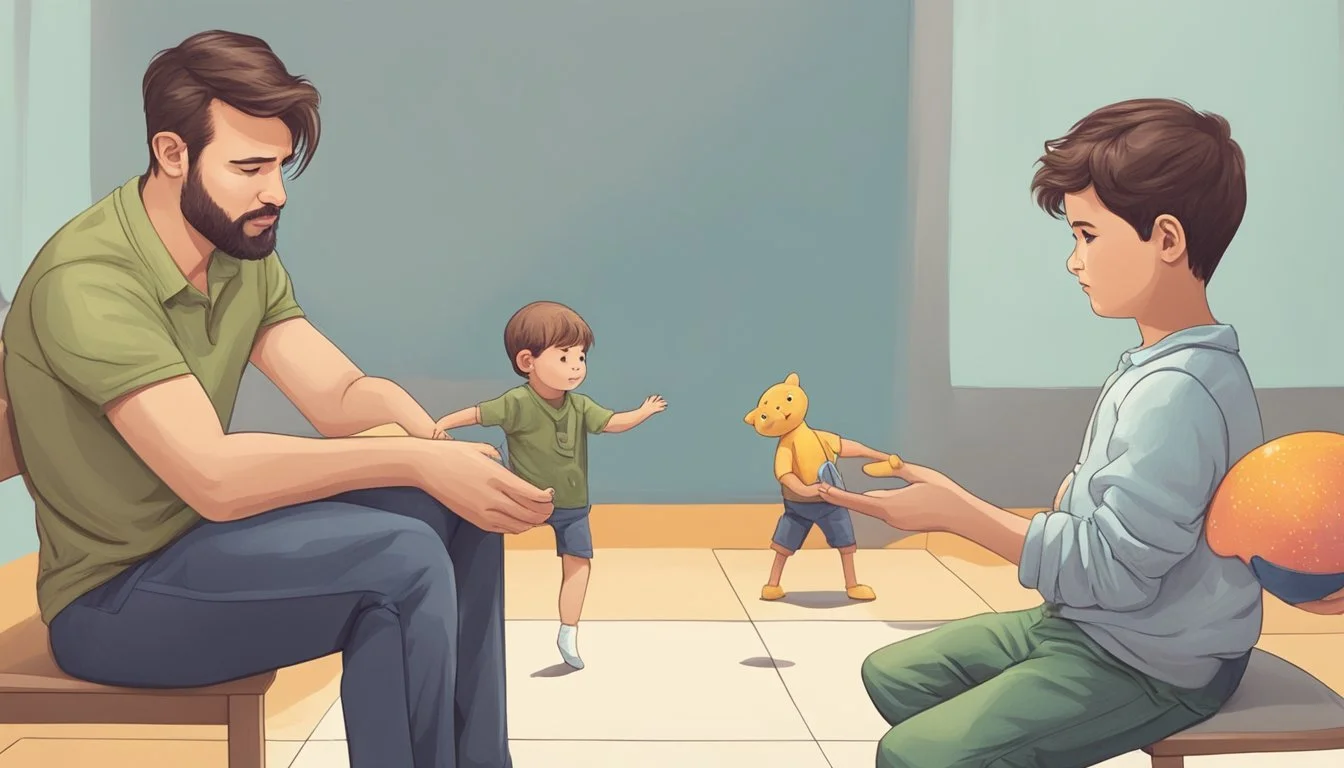Understanding the Narcissist Jealous of Child: A Troubling Family Dynamic
Narcissistic parents can harbor jealousy towards their own children, a surprising and troubling dynamic that undermines healthy family relationships. This envy often stems from deep-seated insecurities and a constant need for admiration. Narcissistic parents may feel threatened by their child's successes, happiness, or independence, viewing these as competition rather than reasons for pride.
Children of narcissistic parents face unique challenges as they navigate this complex emotional landscape. Their achievements may be met with resentment rather than celebration, and their growing autonomy could trigger parental hostility. This jealousy can manifest in various ways, from subtle undermining to outright sabotage of the child's efforts and accomplishments.
Understanding this phenomenon is crucial for both children and adults who have experienced narcissistic parenting. Recognizing the signs of parental jealousy can help individuals protect their self-esteem and establish healthier boundaries. It also sheds light on the importance of addressing narcissistic tendencies in parenting to foster supportive, nurturing family environments.
Understanding Narcissism
Narcissism is a complex personality trait characterized by an inflated sense of self-importance and a deep need for excessive attention and admiration. It can significantly impact relationships, particularly between parents and children.
Defining Narcissistic Personality Disorder
Narcissistic Personality Disorder (NPD) is a mental condition in which individuals have an exaggerated sense of their own importance. People with NPD often display a pattern of grandiosity, need for admiration, and lack of empathy.
Key features of NPD include:
Excessive self-importance
Preoccupation with fantasies of success, power, or ideal love
Belief in one's own uniqueness or superiority
Need for constant admiration
Sense of entitlement
NPD affects about 1% of the general population. It typically begins in early adulthood and can persist throughout life if left untreated.
Traits of Narcissistic Personalities
Narcissistic personalities exhibit distinct behavioral patterns that set them apart from others. These traits often stem from deep-seated insecurities and a fragile sense of self-esteem.
Common traits include:
Grandiosity and exaggeration of achievements
Expectation of constant praise and admiration
Exploitation of others for personal gain
Lack of empathy towards others' feelings
Arrogant and haughty behaviors or attitudes
Narcissists often struggle with criticism and may react with rage or contempt when their perceived superiority is challenged. They frequently compare themselves to others and may feel intense envy or believe others are envious of them.
Narcissism and Parent-Child Dynamics
In parent-child relationships, narcissistic tendencies can lead to harmful dynamics. Narcissistic parents may view their children as extensions of themselves rather than independent individuals.
This perspective can result in:
Jealousy towards the child's successes or achievements
Attempts to sabotage the child's independence
Constant comparison between parent and child
Emotional manipulation and control
Children of narcissistic parents often struggle with low self-esteem and may develop people-pleasing behaviors. They may feel pressured to meet unrealistic expectations or face criticism and emotional neglect.
Recognizing these patterns is crucial for understanding and addressing the impact of narcissism on family relationships.
The Narcissist's Jealousy Towards their Child
Narcissistic parents often experience intense jealousy towards their own children. This unhealthy dynamic stems from deep-seated insecurities and a distorted view of the parent-child relationship.
Roots of Jealousy in Narcissistic Parents
Narcissistic parents see their children as extensions of themselves rather than separate individuals. They struggle to cope with their child's growing independence and achievements. This triggers feelings of inadequacy and fear of being overshadowed.
The parent's fragile self-esteem leads them to view their child's successes as threats. They may feel resentful when the child receives praise or attention from others. The narcissist's need for constant validation clashes with the natural focus on the child's needs and accomplishments.
Unresolved childhood issues often fuel this jealousy. The narcissistic parent may have experienced neglect or criticism in their own upbringing, leading to a competitive attitude with their child.
Manifestations of Jealousy in Parenting
Jealous narcissistic parents often engage in sabotaging behaviors. They may belittle their child's achievements or set unrealistic expectations. Some withhold affection or support when the child excels.
These parents frequently compare themselves to their children unfavorably. They might boast about their own accomplishments to overshadow the child. In extreme cases, they actively undermine their child's efforts to succeed.
Emotional manipulation is common. The parent may guilt-trip the child for pursuing their own interests or relationships. They often react with anger or resentment to the child's normal emotional needs.
The lack of empathy in narcissistic parents exacerbates the situation. They struggle to recognize or validate their child's feelings, focusing solely on their own emotional state.
Impact on the Child
Children of narcissistic parents often face significant challenges to their psychological and emotional well-being. These impacts can be far-reaching, affecting various aspects of their lives well into adulthood.
Effects on Self-Esteem and Identity
Narcissistic parents' jealousy can severely damage a child's self-esteem and sense of identity. Children may internalize criticism and develop a distorted self-image. They often struggle to recognize their own worth and abilities.
This constant undermining can lead to self-doubt and insecurity. Children may feel pressured to meet unrealistic expectations, fearing disapproval or rejection. As a result, they may have difficulty developing a strong sense of self.
Many children of narcissists become people-pleasers, always seeking validation from others. This can hinder the development of autonomy and independence crucial for healthy adult functioning.
The Emotional Toll of Parental Jealousy
Parental jealousy creates a toxic emotional environment for children. They may experience:
Anxiety and depression
Feelings of guilt and shame
Emotional neglect or abandonment
Confusion about their own feelings and needs
Children often feel responsible for their parent's emotional state. This burden can lead to hypervigilance and difficulty trusting others. Many struggle with setting boundaries and expressing emotions in healthy ways.
Trauma from this emotional abuse can manifest in various ways, including:
Panic attacks
Chronic stress
Difficulty regulating emotions
Low self-worth
Long-Term Consequences for Adult Relationships
The impact of narcissistic parenting often extends into adulthood, affecting relationships and overall well-being. Adults who grew up with narcissistic parents may:
Have trouble forming secure attachments
Struggle with intimacy and vulnerability
Repeat unhealthy relationship patterns
Experience difficulty trusting others
Many develop maladaptive coping mechanisms, such as codependency or avoidance. They may also struggle with setting healthy boundaries in personal and professional relationships.
Some adults may unconsciously seek out partners who mirror their narcissistic parent's behavior. This can perpetuate cycles of emotional abuse and instability in their own lives.
Healing from this childhood trauma often requires professional help and dedicated self-work. Therapy can aid in developing healthier relationship patterns and rebuilding self-esteem.
Narcissistic Family Roles
Narcissistic families operate with distinct roles assigned to children by the narcissistic parent. These roles shape family dynamics and impact relationships between siblings and with the parent.
The Golden Child and Scapegoat Dynamic
The golden child receives praise and favoritism from the narcissistic parent. This child is viewed as an extension of the parent's grandiose self-image. The golden child often excels to maintain approval.
In contrast, the scapegoat bears blame for family problems. This child faces criticism and emotional abuse. They may develop low self-esteem and struggle with relationships later in life.
Roles can shift over time based on the narcissist's needs. A former golden child may become the scapegoat if they displease the parent. This instability creates confusion and insecurity for children.
Triangulation and Sibling Relationships
Narcissistic parents use triangulation to maintain control. They pit siblings against each other, fostering rivalry and preventing alliances. This tactic keeps children competing for approval.
Siblings may struggle to form close bonds. The golden child may resent the scapegoat for "causing" family issues. The scapegoat may envy the golden child's favored status.
As adults, siblings from narcissistic families often have strained relationships. They may continue patterns of competition or mistrust learned in childhood. Healing requires recognizing these dynamics and working to build healthier connections.
Coping and Healing Strategies
Recovering from the effects of a narcissistic parent requires developing specific skills and seeking support. Effective strategies focus on establishing boundaries, building a support network, and engaging in therapeutic interventions.
Developing Healthy Boundaries
Setting and maintaining clear boundaries is crucial for children of narcissistic parents. This involves learning to say "no" and prioritizing one's own needs. Boundaries can be physical, emotional, or digital.
Clear communication is key. Use "I" statements to express feelings and needs without attacking. For example: "I feel uncomfortable when you criticize my choices. I need you to respect my decisions."
Practice self-care and self-compassion. Recognize that it's okay to put yourself first sometimes. This may feel unnatural at first, but it's an essential part of healing.
Be prepared for pushback. Narcissistic parents often resist boundaries. Stay firm and consistent. Remember that you have the right to protect your emotional well-being.
Building a Support System Outside the Family
Expanding one's social circle provides emotional support and perspective. Seek out friends, mentors, or support groups who understand narcissistic family dynamics.
Join online forums or local support groups for children of narcissistic parents. These communities offer validation and practical advice from others with similar experiences.
Cultivate relationships with emotionally healthy individuals. Observe how they interact and set boundaries. This can provide a model for healthier relationships.
Consider confiding in a trusted teacher, coach, or family friend. Having an adult ally can be invaluable, especially for younger individuals still living with narcissistic parents.
Therapeutic Interventions for Recovery
Professional help can be instrumental in healing from narcissistic parenting. Cognitive-behavioral therapy (CBT) helps identify and change negative thought patterns and behaviors.
Trauma-focused therapies like EMDR can address deep-seated emotional wounds. These approaches help process and integrate difficult experiences.
Group therapy offers a safe space to share experiences and learn from others. It can reduce feelings of isolation and shame.
Family therapy may be beneficial in some cases, but only if the narcissistic parent is willing to participate constructively. Individual therapy is often a safer starting point.
Consider alternative therapies like art therapy or mindfulness practices. These can provide additional tools for emotional regulation and self-expression.
Navigating Parental Relationships
Dealing with narcissistic parents requires careful strategies to protect one's well-being while maintaining family ties. Setting boundaries and fostering independence are crucial steps in navigating these complex relationships.
Strategies for Interacting with a Narcissistic Parent
Establishing clear boundaries is essential when dealing with narcissistic parents. Children should communicate their limits firmly but respectfully. It's important to avoid engaging in arguments or trying to change the parent's behavior.
Limiting contact can be an effective strategy. This may involve shorter visits or less frequent communication. Children should focus on neutral topics and avoid sharing personal information that could be used for manipulation.
Seeking support from others, such as siblings, friends, or a therapist, can provide valuable perspectives and coping mechanisms. Building a strong support network helps counteract the negative effects of a narcissistic parent's behavior.
Maintaining Autonomy and Independence
Developing a strong sense of self is crucial for children of narcissistic parents. This involves recognizing and validating one's own feelings and experiences, rather than relying on the parent's approval.
Financial independence is key to reducing a narcissistic parent's control. Children should work towards supporting themselves and making their own decisions about their lives and careers.
Pursuing personal interests and relationships outside the family unit helps create a fulfilling life separate from the parent's influence. This fosters a sense of identity and self-worth not tied to parental validation.
Setting realistic expectations about the relationship is important. Accepting that the parent may never change allows children to focus on their own growth and well-being.
Conclusion
Narcissistic parents who become jealous of their children's success or happiness can have a profound impact on their offspring's emotional well-being. This dynamic often stems from the parent's own insecurities and unrealistic expectations.
Children raised by jealous narcissists may struggle with self-esteem issues and difficulty forming healthy relationships. They may internalize feelings of inadequacy or guilt for surpassing their parent's achievements.
Recognizing these patterns is crucial for healing. Seeking professional help can provide valuable tools for setting boundaries and developing self-compassion. Therapy may also assist in addressing trust issues and anxiety that commonly arise from this upbringing.
It's important to note that not all individuals with narcissistic personality disorder exhibit jealousy towards their children. However, when present, this behavior can significantly hinder a child's emotional growth and sense of self-worth.
Breaking free from the cycle of narcissistic parenting requires awareness, support, and dedication to personal growth. With time and effort, children of jealous narcissists can learn to thrive independently and build fulfilling lives.





